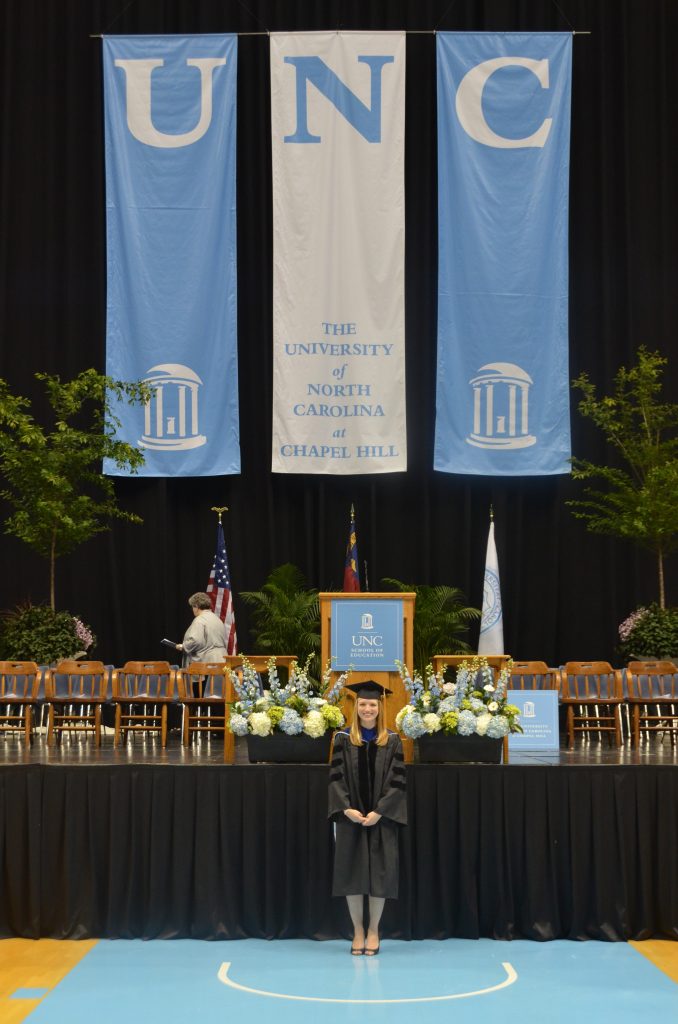Chemistry PhD Learned Essential Intellectual Skills as Ashbrook Scholar
December 24, 2020

Most Ashbrook Scholars major in history and political science. Some take a minor in the field while focusing on other areas. Among the latter is Alumna Katie Moga, who recently defended her PhD thesis in a cutting-edge area of analytical chemistry research. She credits the Scholar program with building skills in intellectual inquiry that she found indispensable during her doctoral study at the University of North Carolina, Chapel Hill.

Entering Ashland University, Moga wanted to swim on a college varsity team while also seriously pursuing academics. She planned a career teaching high school chemistry. This would commit her to long hours of work in the chemistry lab and in practice teaching, as well as to long practices in the pool. Ashland’s then swimming coach, Paul Graham, honored her academic commitments and suggested she add yet another. “Why don’t you take a look at the Ashbrook Scholar program? If you like learning, you’ll like it.”
Intrigued, Moga applied and was accepted as an Ashbrook Scholar. The program challenged her cautious scientific approach: “I’m the kind of person who can see both sides of every issue,” Moga said. Because she came to college with strong writing skills, “coming up with the ideas for that first paper was harder” than writing it clearly and gracefully. But Ashbrook professors, assuring her that “your opinion matters,” pushed her to reach her own political and philosophical conclusions.
She chose a statesmanship thesis that pushed her further. The Scholar program would have allowed her to write on her chemistry research, but Moga chose instead to examine “the role of science education in America,” under an advisor, Matthew Arthur, who taught in both the chemistry and education programs at Ashland. This helped her understand “why I wanted to teach” as well as the “lifelong learning goals” advisable for students in any field. Her research showed that “Americans are taught scientific facts but not how to think like a scientist.” We need instead to develop scientific literacy: “how to ask questions. You don’t need to memorize the periodic table to be a good scientist,” Moga said, offering an insight that applies as well to the field of history as to science.
The experience of writing and defending a thesis served her well in graduate school, where her chemistry study led her to personalized medicine. Her research bears ethical implications. “It’s not unusual to get a question about the philosophy of your research when you give a talk.”
Moga’s lab at Carolina that specializes in nanoparticles, developing a range of extraordinarily miniaturized devices. For her doctoral thesis, she developed and tested microneedles for the delivery of vaccines and targeted cancer therapies. Her thesis advisor, Joseph M. DeSimone, invented a platform called PRINT—Particle Replication In Nonwetting Templates—that offers a revolutionary approach to manufacturing very small particles. Using fluoropolymers, Moga and her colleagues can “mold features down to 50 nanometers. That’s 300 times smaller than the width of a human hair,” Moga said. Microneedles manufactured in this way are able to deliver medicines easily and painlessly, through small patches applied to the skin.
Moga loves the stimulating environment of a top research university. She now seeks a faculty position at a university, helping undergraduates learn to conduct research and explore careers in science. “I would not be in graduate school without having done research as an undergrad, so I would like to give that opportunity to someone else,” she said.
Ultimately, Moga credits the Ashbrook program with teaching her “how to ask good questions of anybody I can learn from. I’ve incorporated that into every aspect of my education.”

